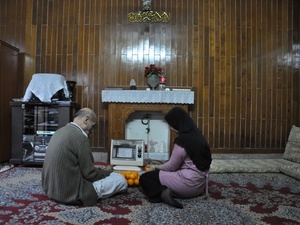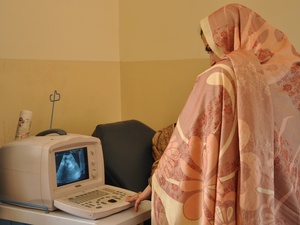FIELD INTERVIEW - Peter Kessler, External Relations Officer with the Emergency Response Team, Pakistan
FIELD INTERVIEW - Peter Kessler, External Relations Officer with the Emergency Response Team, Pakistan
What is your usual role with UNHCR?
I'm a First Officer. I'm currently waiting to be posted to Modova where I'll be a Country Representative.
Have you been on an emergency mission previously?
I've actually had extensive field experience - in Sarajevo 92-95, in Congo in late 80s and extensively in Guinea, Eritrea, Pakistan in 2001. Pakistan again in 2002, Jordan and others - all with UNHCR.
When did you arrive in Pakistan this time?
I was mobilised a week ago Monday to come out - I got a call Monday night [Aug 2]and got my visa Tuesday and was on a plane Wednesday and was in the office 10am Thursday morning [Aug 5].
Can you give a quick overview of the scope of this disaster, given what you've seen in the past?
It is such a calamity. You can't believe you are looking at areas where people used to live, because the land has just been submerged - either swept clear or submerged. You see areas that were inhabited and now you are just looking at a lake. It's like imagining oceans just opening up and swallowing the territory. It's hard to put into words. It's hard to put into pictures, it's hard to put into television because you can't show what has happened under that water and it all looks alike - villages, farmland, pastoral land where thousands of animals have drowned. It is a massive, all encompassing disaster.
People are camped out everywhere, along the roads and highways, along the railway tracks, in public buildings, in schools. It is mostly affecting tenant farmers, people who are very poor already - people who have so much to lose when their rice, their animals, their possessions are swept away.
Do you have an individual story that encapsulates this sense of loss?
I saw a man get his kit of NFIs and take out a blanket and wrap it around his baby water buffalo. He just wanted to ensure that the calf would stay alive because his family is going to need that calf in a couple of months. It was surprising to me to see him give up his own warm dry blanket but it really shows how much people have lost, that this one animal meant so much to that family's survival.
How many ERT members are on the ground now?
I'm the only one so far - more could be mobilised in the coming days. But of course I am working with a large country staff here. UNHCR has an existing program here due to the displacement of more than a million people (of whom a million people are still displaced) from the conflict in the Swat Valley and other areas of north western Pakistan last year plus, of course, the 1.7 million Afghan refugees who are still here.
What has happened to those IDP camps near Islamabad that were the focus of UNHCR's emergency operations last year?
They've suffered really significant damage, significant damage. And our warehouses in the Peshawar region - there was virtually a wall of water that swept across that entire area and everything - our warehouses, the facilities there, the WFP warehouse Imagine the shelves of your local supermarket submerged in water up to three metres deep. It has been really massive and our stocks have been devastated.
Of course plastic tarps and tents can be dried out and kitchen sets can be put in new boxes because the boxes have all fallen apart but the WFP warehouse across the road which had 57 tonnes of food - that was hit with three metres of water and the sacks of flour and rice have just soaked everything up [see blog] so it's really horrible.
Is UNHCR getting relief flights in there now?
We are looking at the possibility and UNHCR is talking to various governments to see if they might have airlift capacity to both help us move supplies into Balochistan which is really cut off as well as possibly elsewhere in the country.
At the moment you're repositioning supplies from elsewhere in Pakistan?
That's right. At the moment we have already purchased large amounts of items which are coming into our warehouses. Approx 8000 tents a week are coming in and we will possibly be bringing in further items in due course from overseas.
And where is the mission based?
In our headquarters here in Islamabad and from other places too.
So what is the main activity - the priority - of the emergency team right now?
We are working within the UN "cluster" system and UNHCR is very much involved with what we call the 'protection' cluster and the 'shelter' cluster. We are trying to work with partners to ensure the protection of women and children who are homeless and camped out in public buildings, sometimes schools which are very very crowded - sometimes ten families per classroom - and that leaves women and children very much exposed to a range of threats. So we are working to find solutions for them. And we are distributing shelter. We are the cluster lead in Balochistan and Khyber Pakhtunkhwa, two of the provinces that are most seriously affected by the flooding. Because in part, the authorities had a little more time to move people to safety in provinces like Sind and Punjab but not in Balochistan and Khyber Pakhtunkhwa, so the situation is that much more serious in those areas.
How are you distributing the relief?
We are not dropping stuff out of helicopters - at least not so far. These are very heavy items and we are also concerned that these things to not just fall into the hands of the fittest and not reach the people in most need. Ideally, we want to be giving things to the people in need either directly or through our local partners.
Is UNHCR playing a coordination role in tented camps?
Yes we are very much - although our position is to try to avoid the authorities setting up these camps. Ideally we want people to stay near their homes and return back to their homes as soon as they can. Of course, in many cases, homes have been completely destroyed and the people are not able to move home immediately but we are trying to keep people in shelter adjacent to their villages. Some of these buildings - schools etc - are very congested and in some places it may become necessary to set up more formal camp structures to decongest these facilities and give the people a little more private space at least.
But how can people camped along a roadside have access to clean drinking water?
Well, yes, that's a very serious problem and that's why we are giving people plastic buckets and jerry cans so that they can ideally carry water from safe locations. UNHCR also has a number of water tankers working in these locations due to our work with refugees and IDPs in these areas.
We are hearing news reports of water borne diseases. Have you had confirmed reports of cholera cases?
People are definitely getting diarrhoea and similar problems and obviously there is a real danger that people will begin to get seriously ill. We haven't had a confirmed case of cholera yet but it's a real danger. Of course, sanitation has just broken down completely and many of the wells are clogged with mud, with human and animal faeces and even the remains of animals in many cases. so there are real dangers out there. One of our goals, once it's possible for people to go home, will be to rehabilitate some of these facilities to ensure that people have access to clean water.
So what would you say to donors as this appeal goes out around the world?
This is a massive crisis. It is like having a refugee influx happening everywhere at once, and all the time because the impact of these bloated river is still expanding in many areas. It really was like a wall of water sweeping down upon them and they may not have escaped with very much at all. Many of them had to flee their homes in a matter of minutes. There is a massive need for things like blankets, plastic sheeting, quilts and dry bedding materials, kitchen sets - people have lost all their cooking materials - they have no means of boiling water or cooking their food.It's a crisis which, in many cases, has hit the poorest people - those least able to look out for themselves and rebuild. And this is a challenge for them as individuals but also for Pakistan as a country. It's going to take a long time to get through, when you think about the sheer numbers of homes, of life stock that have been lost, the crops, the food supply - it's a terrible challenge.
How do you think UNHCR has responded so far?
I think the management team here is inspirational. Their efforts to meet the needs are really creative and their experience here is highly valuable. It's inspiring to see the degree of motivation, to see UNHCR looking beyond its mandate and helping those people who normally wouldn't be on our assistance list but because we're here, because we have the stockpiles in the country , because we have so many refugees and IDPs displaced by conflict living in the flood affected areas, obviously we have a role to play. We have to meet their needs.












